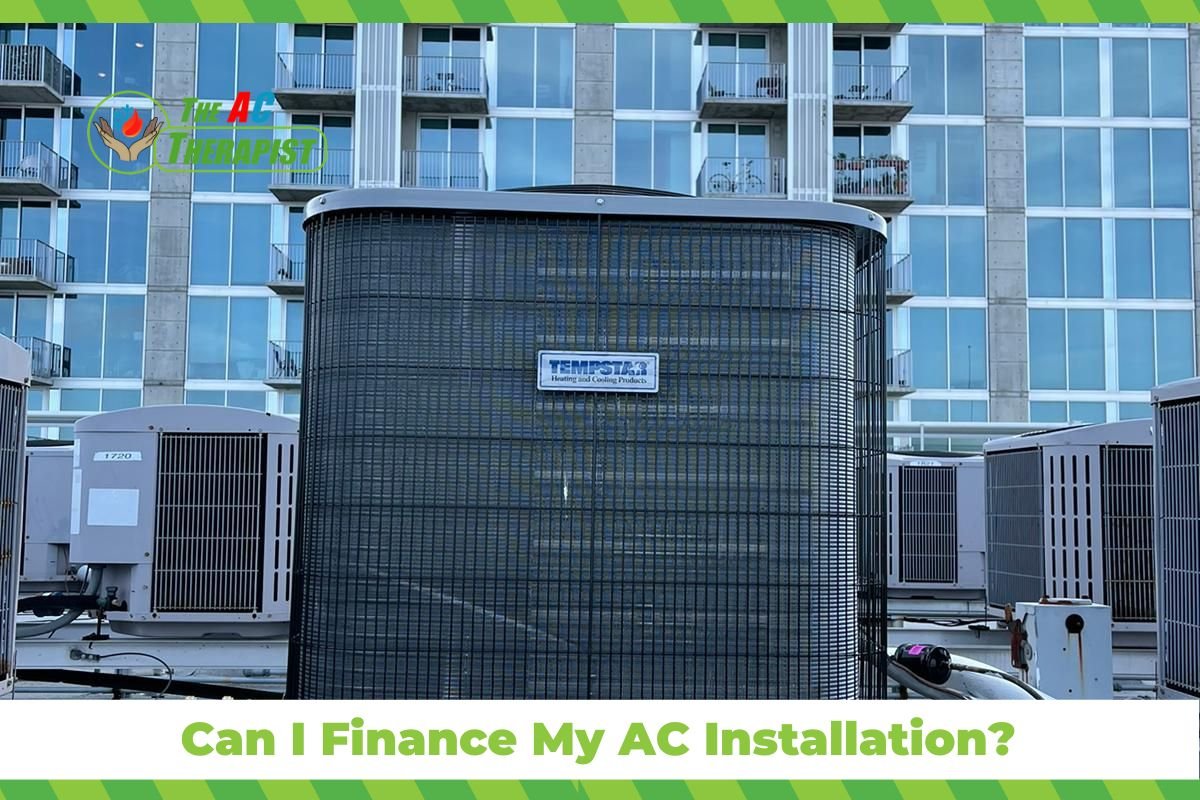Can I Finance my AC Installation? Exploring Your Options for a Comfortable Home
HVAC (Heating, Ventilation, and Air Conditioning) systems are essential in ensuring that our homes remain comfortable throughout the year.
However, the cost of purchasing and installing a new HVAC system can be prohibitive for many homeowners.
Thankfully, financing options are available for those looking to upgrade or replace their existing systems.
In this comprehensive guide, we’ll explore the various financing options for HVAC systems, as well as the factors to consider when choosing the best option for your needs.
Understanding HVAC System Financing
HVAC system financing refers to the borrowing of funds to purchase and install a new heating and cooling system in your home. This can be done through various lenders, including banks, credit unions, and your local HVAC service company. Most air conditioning service companies have partnerships with financing services to offer such services to their customers. The terms and conditions of these loans will vary depending on the lender and your creditworthiness.
Some common features of HVAC financing options include:
- Fixed or variable interest rates
- Loan terms range from 12 months to 15 years.
- Secured or unsecured loans
- The possibility of early repayment without penalties
- 0% Interest
Types of HVAC Financing Options
There are several types of financing options available for HVAC systems, including:
Personal Loans
Personal loans can be used for any purpose, including financing an HVAC system. You can apply for a personal loan through your bank, credit union, or an online lender. Interest rates will vary depending on your credit score, loan amount, and term length. Personal loans are usually unsecured, meaning they don’t require collateral.
Home Equity Loans and Lines of Credit (HELOC)
If you have equity in your home, you can use a home equity loan or line of credit to finance your HVAC system. These loans use your home as collateral, which typically results in lower interest rates compared to personal loans. A home equity loan offers a lump sum payment, while a HELOC provides a line of credit that you can draw from as needed.
Home Improvement Unsecured Loans
Home improvement unsecured loans are specifically designed for financing home improvement projects, including HVAC system upgrades. These loans do not require collateral, making them a suitable option for homeowners who do not have enough equity in their home or prefer not to use their home as collateral. Interest rates for home improvement unsecured loans may be higher than those for secured loans, but they are often more competitive than rates for general-purpose personal loans or credit cards.
Credit Cards
Some homeowners may choose to finance their HVAC system using a credit card. This can be a convenient option, especially if you have a card with a low or zero-interest promotional period. However, be cautious about using this method, as credit card interest rates can be high, and carrying a large balance can negatively impact your credit score.
Manufacturer Financing
Many HVAC manufacturers offer financing options directly to customers. These programs often have competitive interest rates and promotional offers, such as zero-interest periods or reduced payments for a set time. Be sure to read the terms and conditions carefully, as some manufacturer financing options may require you to use their preferred contractors for installation.
Energy Efficiency Loans and Rebates
Some government programs, utilities, and nonprofit organizations offer low-interest loans or rebates for energy-efficient HVAC systems. These programs are designed to encourage homeowners to upgrade to more environmentally friendly and cost-effective heating and cooling solutions. To qualify, you may need to purchase a system with a specific energy efficiency rating (such as ENERGY STAR) and work with an approved contractor.
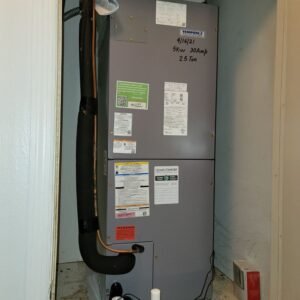
Factors to Consider When Choosing HVAC Financing
Before deciding on a financing option for your HVAC system, consider the following factors:
- Interest Rates: Compare interest rates across various lenders to ensure you’re getting the best possible deal. Remember that lower interest rates will save you money in the long run.
- Loan Terms: Evaluate the length of the loan term and consider how it will impact your monthly payments and the total cost of the loan.
- Fees and Penalties: Be aware of any additional fees or penalties associated with the loan, such as origination fees or early repayment penalties.
- Credit Score Impact: Some financing options may have a greater impact on your credit score than others. For example, carrying a large balance on a credit card can lower your credit score, while a well-managed personal loan may have a positive effect.
- Tax Incentives and Rebates: Research available tax incentives and rebates for energy-efficient HVAC systems in your area, as these can significantly reduce the overall cost of your upgrade.
- Contractor Compatibility: Some financing options may require you to work with specific contractors or installers. Ensure that you’re comfortable with the professionals you’ll be working with and that they have a good reputation for quality and customer service.
- Budget: Consider your overall budget and how a new HVAC system loan will fit into your monthly expenses. Ensure that you can comfortably afford the monthly payments without stretching your finances too thin.
Applying for HVAC Financing
Once you’ve selected the best financing option for your needs, you’ll need to apply for the loan or credit. The application process will vary depending on the lender, but you can generally expect the following steps:
- Gather necessary documentation: This may include proof of income, tax returns, bank statements, and information about your current HVAC system.
- Complete the application: You’ll need to fill out an application form, either online or in person, providing your personal and financial information.
- Await approval: The lender will review your application and perform a credit check. This may take anywhere from a few hours to a few days, depending on the lender.
- Receive your funds: If your application is approved, the lender will provide you with the funds to purchase and install your new HVAC system. This may be disbursed directly to the contractor or to you, depending on the terms of your loan.
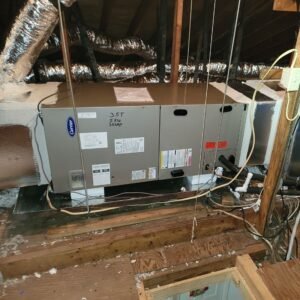
What credit score do you need to finance an AC unit?
There is no specific credit score required to finance an AC unit, as eligibility will depend on the lender’s criteria and the type of financing option you choose. However, a higher credit score will generally increase your chances of getting approved for financing and securing more favorable terms, such as lower interest rates.
For most financing options, a credit score of 650 or above is considered fair to good and may qualify you for financing. However, some lenders may approve applicants with lower credit scores, while others may require higher scores for the best rates and terms. It’s essential to research and compare lenders and their requirements to find the most suitable option based on your credit score and financial situation.
Can I buy AC on credit card?
Yes, you can buy an AC unit on a credit card, provided your credit card has a sufficient available credit limit to cover the purchase cost. Using a credit card can be a convenient way to finance your AC unit, especially if you have a card with a low or zero-interest promotional period.
However, there are a few things to consider before deciding to use a credit card for this purchase:
- Interest Rates: Credit card interest rates are typically higher than those for other financing options, such as personal loans or home equity loans. If you don’t pay off the balance quickly, the interest can accumulate, making the overall cost of the AC unit much higher.
- Credit Utilization: Using a significant portion of your available credit to buy an AC unit may increase your credit utilization ratio, which can negatively impact your credit score. It’s generally recommended to keep your credit utilization below 30% of your total credit limit.
- Monthly Payments: Credit card payments are usually more flexible compared to other financing options, as you can choose to pay the minimum amount, the full balance, or any amount in between. However, making only the minimum payments may result in a longer repayment period and higher interest costs.
- Rewards and Cashback: Some credit cards offer rewards, cashback, or other benefits for purchases made with the card. Depending on the card, using it to buy an AC unit may help you earn rewards or cashback, which can partially offset the cost of the purchase.
If you decide to use a credit card to buy an AC unit, try to pay off the balance as quickly as possible to minimize interest charges and avoid negatively impacting your credit score.
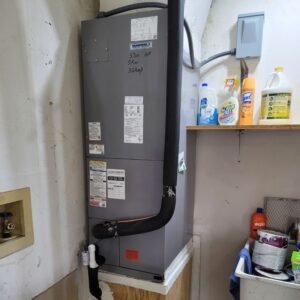
Is it better to finance or pay cash for an AC unit?
Deciding whether to finance or pay cash for an AC unit depends on your financial situation, personal preferences, and the available financing options. Here are some factors to consider when making this decision:
- Cash Availability: If you have enough cash saved up to cover the cost of the AC unit without significantly impacting your emergency fund or other financial goals, paying cash may be the best option. Paying cash allows you to avoid interest charges and loan fees, ultimately making the AC unit less expensive in the long run.
- Interest Rates: If you choose to finance the AC unit, consider the interest rates offered by various lenders. If you can secure a low-interest rate or a zero-interest promotional period, financing the AC unit may be more cost-effective than depleting your cash reserves.
- Budget and Cash Flow: Financing the AC unit allows you to spread the cost over a longer period, making it easier to manage your monthly budget. However, this also means you’ll have an additional monthly payment to consider, so ensure that you can comfortably afford the payments without straining your finances.
- Opportunity Cost: When deciding between financing and paying cash, consider the opportunity cost of using your cash for the purchase. If you have other high-interest debt to pay off, or if you can invest the cash in an opportunity with a higher return than the interest rate on the financing option, it may be more financially beneficial to finance the AC unit and use your cash elsewhere.
- Credit Score Impact: Financing the AC unit will result in a hard inquiry on your credit report and may impact your credit score. On the other hand, paying cash won’t affect your credit score. If you’re planning a significant financial event in the near future, such as applying for a mortgage or an auto loan, consider how financing the AC unit may affect your creditworthiness.
In conclusion, the choice between financing and paying cash for an AC unit depends on your financial situation and priorities. Weigh the pros and cons of each option, considering factors like interest rates, cash flow, opportunity cost, and credit score impact to make the best decision for your circumstances.
Does buying AC increase home value?
Installing a new, energy-efficient air conditioning (AC) system can potentially increase your home’s value, especially if the existing system is old, inefficient, or non-existent. However, the extent to which it increases your home value will depend on several factors, including the local real estate market, climate, and the specific system you choose to install.
Here are some reasons a new AC system might increase your home’s value:
- Improved Comfort: A new AC system can improve the overall comfort of your home by providing better temperature control and air quality. This can be particularly appealing to prospective buyers in regions with hot summers or high humidity levels.
- Energy Efficiency: Upgrading to an energy-efficient AC system can lead to lower utility bills, which can be an attractive selling point for potential buyers. ENERGY STAR-rated systems or those with high Seasonal Energy Efficiency Ratios (SEER) are particularly desirable.
- Lower Maintenance Costs: Newer AC systems typically require less maintenance and have longer lifespans than older models. This can make your home more appealing to buyers who are looking for a low-maintenance option.
- Environmental Impact: Some buyers prioritize eco-friendly features in a home. Installing an energy-efficient AC system with environmentally friendly refrigerants can make your property more appealing to this demographic.
While a new AC system can increase your home’s value, it’s essential to consider the costs of the installation and whether the potential increase in value outweighs the investment. The impact on your home’s value will vary depending on your specific situation, and it’s a good idea to consult with a local real estate professional to better understand how a new AC system may affect your property’s market value.
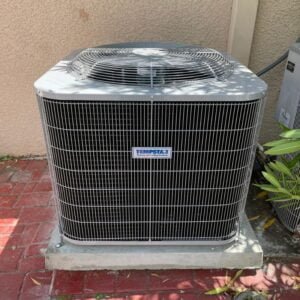
Is Installing a New AC a good investment?
Installing a new air conditioning (AC) system can be a good investment, depending on your current system’s condition, your home’s energy efficiency, and the climate in your region. Here are some factors to consider when deciding if a new AC system is a good investment for you:
- Energy Efficiency: If your current AC system is old or inefficient, upgrading to a new, energy-efficient system can lead to significant energy savings. Newer systems with higher Seasonal Energy Efficiency Ratios (SEER) ratings or ENERGY STAR certifications can reduce your energy consumption and lower your utility bills, potentially offsetting the cost of the new system over time.
- Improved Comfort: A new AC system can provide more consistent temperature control and improved indoor air quality, leading to increased comfort in your home. This can be particularly valuable in regions with hot summers or high humidity levels.
- System Lifespan and Maintenance: Older AC systems may require more frequent repairs and maintenance, and their lifespans may be nearing their end. Installing a new system can reduce maintenance costs and provide you with a more reliable cooling solution.
- Home Value: As previously mentioned, a new AC system can potentially increase your home’s value, particularly if the existing system is outdated or non-existent. This can be an important factor if you plan to sell your home in the near future.
- Environmental Impact: Upgrading to an energy-efficient AC system with environmentally friendly refrigerants can help reduce your home’s carbon footprint, contributing to a more sustainable future.
While a new AC system can be a good investment, it’s essential to weigh the costs of the installation against the potential benefits. Consider factors like energy savings, improved comfort, reduced maintenance costs, and potential impact on your home’s value to determine if investing in a new AC system is the right decision for your situation.
Additionally, before installing a new AC system, it’s a good idea to address any existing issues with your home’s insulation, windows, and ductwork to maximize the efficiency and effectiveness of your new system.
Exploring HVAC Financing Options and Partnering with The AC Therapist for a Comfortable, Energy-Efficient Home
In conclusion, financing your HVAC system can significantly ease the financial burden of upgrading or replacing your existing heating and cooling equipment. With a variety of options available, including personal loans, home equity loans, home improvement unsecured loans, credit cards, manufacturer financing, and energy efficiency loans or rebates, you can find a solution that best suits your individual needs and financial situation.
Before making a decision, it’s crucial to compare interest rates, loan terms, and fees, as well as considering any available tax incentives and rebates. By doing thorough research and selecting the most appropriate financing option, you can enjoy the benefits of a modern, energy-efficient HVAC system without straining your budget.
Moreover, to ensure a seamless installation process and optimal performance of your new HVAC system, we highly recommend engaging the services of a trusted HVAC professional, such as The AC Therapist. The AC Therapist is dedicated to providing top-quality HVAC services, including system installation, maintenance, and repair. With a team of experienced and certified technicians, they are committed to delivering exceptional customer service and ensuring that your HVAC system operates at peak efficiency.
By partnering with The AC Therapist, you can have peace of mind knowing that your HVAC system will be installed and maintained by industry experts. Their comprehensive range of services, combined with their expertise in energy-efficient HVAC solutions, can help you make the most of your investment in both comfort and long-term savings.
In summary, financing your HVAC system is a viable option that can make your dream of a comfortable, energy-efficient home a reality. By exploring various financing options and working with reliable professionals like The AC Therapist, you can enjoy the benefits of a modern HVAC system and contribute to a greener, more sustainable future.

